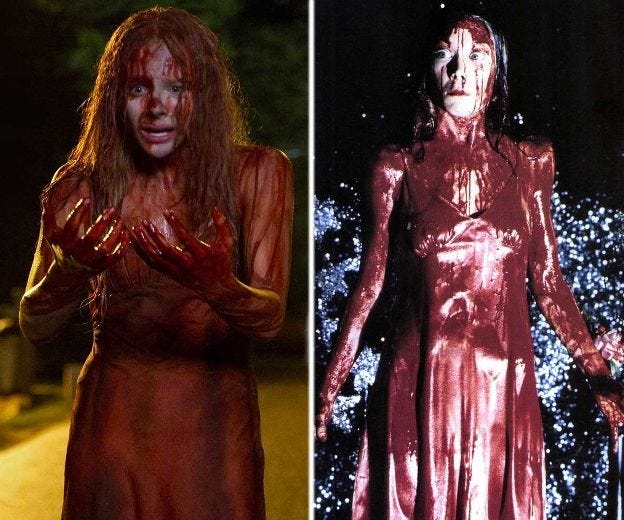Carrie

Dripping with style and dread, Brian De Palma’s 1976 classic “Carrie” is an essential horror film. This year’s remake is a timely, poignant high school drama that happens to have horror elements.
Adapted from Stephen King’s first novel, the story is the stuff of iconic campfire legend. Raised by a fire-and-brimstone-preaching mother (played with powerful menace by Julianne Moore), Carrie White (the magnetic Chloë Grace Moretz) is a wide-eyed outcast. Unsympathetic toward her pains of puberty, her peers constantly bully her, even throwing tampons at her and calling her names when she panics in the shower room during her first period.
During this scene, director Kimberly Peirce (“Boys Don’t Cry”) and writers Lawrence D. Cohen and Roberto Aguirre-Sacasa add a timely touch. They show “queen bee” Chris (the gloriously catty Portia Doubleday) filming and posting the tampon incident on YouTube. When this video of a terrified Carrie is projected on a large screen at the prom, it is meant to humiliate her in the face of fellow students, but it ends up reflecting their fear and insecurity back at them. When you stare into the abyss of social media, the abyss stares back at you, the film suggests.
After reaching her peak of digital and physical abuse, Carrie takes her revenge. This bloody rampage, which was a surreal, shocking spectacle in the ’70s, is disturbingly familiar now, in the wake of school shootings.
This version of “Carrie” is a mesmerizing funhouse mirror of high school angst and aggression. The original film seems to use the high school setting as more of a springboard for horror setpieces. It doesn’t seem to work quite as well as a teen drama like this “Carrie” does. The 1976 film is largely memorable as a tale of a girl with deadly telekinetic powers. The remake, on the other hand, leaves an impact as simply a film about a teen girl struggling to belong.
While watching the original film, viewers giddily anticipate the iconic scene in which Carrie is doused with pig blood at the prom. During the remake, you’ll find yourself so swept up in the bittersweet pathos of the prom and Carrie’s anxiety and aspirations, you’ll forget about the impending grisly spectacle, making it all the more somber and startling when it arrives. It certainly rivals the original sequence, and that's no small feat.
2013 has been a banner year for the horror genre. With “V/H/S/2,” “The Conjuring,” “You’re Next,” and “Insidious: Chapter 2” under its belt, this year has mirrored the magic of the late-’70s, early-to-mid-’80s era of horror. “Carrie” is not only worthy of that list; it also ranks among the best coming-of-age dramas in recent memory, including “The Spectacular Now” and “The Perks of Being a Wallflower.”
The film's poignance is a large credit to its star. With her simultaneous grace and ferocity, Moretz engagingly embodies the film's tone. Like the film itself, she illuminates the humanity beneath the horror.
Sad, sweet, scary and surprising, "Carrie" is one of the best films of the year.
